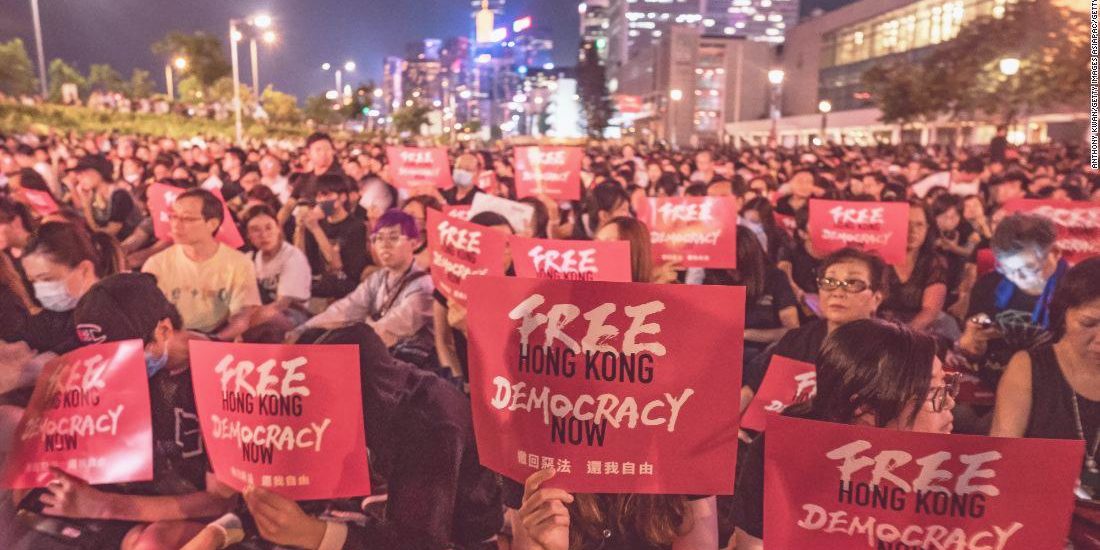- December 19, 2019
- Posted by: Prerna Chahar
- Category: Featured, INTERNATIONAL AFFAIRS, Latest Work, OPINION

The introduction of “Fugitive Offenders and Mutual Legal Assistance in Criminal Matters Legislation (Amendment) Bill” also referred to as the “Anti-Extradition Law Amendment Bill” adumbrated months-long Hong Kong protest. The bill first proposed in February 2019 to the city’s Legislative Council (Legco) by Carrie Lam Cheng Yuet-ngor, Hong Kong’s Chief Executive, marked the beginning of one of the biggest protests in Hong Kong after the Umbrella revolution of 2014.
For the first time, the amendments to the “Fugitive Offenders Ordinance” (FOO) proposed, “it would permit the extradition of alleged criminals from Hong Kong to mainland China, the Macau Special Administrative Region (Macau), and Taiwan”. This led to the large scale demonstration by the people and pro-democratic politicians of Hong Kong demanding the withdrawal and resignation of Carrie Lam. Although the bill was withdrawn on June 15, the focus of the protest expanded to general dissatisfaction among the people regarding the status of Hong Kong under China’s “one country, two systems” policy. What are the main reasons that prompted such massive protests in Hong Kong, and what is at stake for China?
What Prompted the Unrest?
Hong Kong, as a semi-autonomous country, has a unique status. Though it is a city under China, it has its currency, legal, and economic system, as well as the passport system. The unique history of Hong Kong dates back to the end of the Second World War in 1945 when Hong Kong was liberated jointly by the British and Chinese forces and came under British rule. In 1997, Britain gave Hong Kong back to China with one important condition attached under Hong Kong Basic Law. The immediate cause of the protest is the introduction of the bill. However, the genesis of this constant battling can be traced back to this one condition what is popularly known as the “One Country, Two System”.
Under “One Country, Two System” on principle Hong Kong is guaranteed high autonomy, its own government, the legal system, and economic independence, but until 2047. However, people of Hong Kong argue that over the years, these rights have been abraded and defied. Chinese Communist Party of China might not even wait till 2047, and even if it did, the situation would only exacerbate in the near future. For instance, pro-democracy politicians contend that fuller democracy, freedom, personal safety, the rule of law, as promised by China, have not yet entirely been handed over to the people of Hong Kong.
Moreover, the situation has deteriorated in the past, particularly since President Xi Jinping assumed power. From installing the Pro-Chinese education system in 2012 to the disappearance of five book authors and pro-democracy opposition leaders being thrown out of Hong Kong Parliament in 2016 for insulting the Chinese Communist government, China has only tightened its grip over Hong Kong. The proposal of the disputed Extradition Bill shows how “the invisible hands of China are getting more visible” with their sporadic actions and decisions to control Hong Kong autonomy and democracy, states one of the protestors in Hong Kong.
What’s at Stake?
The Hong Kong protest has come up as a real nightmare for the Communist government in China. What started as a peaceful demonstration by the people and pro-democracy supporters against the government authorities is now punctuated by violent outbursts and clashes in Hong Kong. Hundreds and thousands of protesters have come out on the streets to defy the authority of the Communist Party of China, demanding full autonomy and democracy. The recent reports of protesters setting fire at the bridges and entrance of the Polytechnic University show that the clashes between police and protesters are bound to escalate. It leads to options that can abate the current agitation.
There are two possibilities; first, the Communist Party in Beijing can tolerate being defied in a way that undermines and challenges its very authority. This option is paradoxical to the assertive and dictatorial nature of the Communist Party that cannot tolerate defiance of the authority of the Communist leadership. However, what raises the stake for Beijing is the degree with which the movement is taking the violent turn. As the protest grows more violent, and the situation becomes volatile, it will further increase the chance of Chinese government intervention. Some people fear that Tiananmen Square thirty years is on, and another similar episode can take place, but this time in Hong Kong.
The second possibility is the military intervention as a tool to crush and take control of Hong Kong by China. This option although has not been operationalized, but has already been tested with military troops of PLA marching in large numbers in Hong Kong as an example that anything that defies the authority of the Communist Party will be crushed. However, what raises the stake for Beijing here is the financial risk, as rolling down of troops in Hong Kong can prove to be an ‘economic catastrophe’ for Beijing. Hong Kong is not only the hub of the world’s financial centre but due to its strategic location, it is the window for China to interact with the outside world and to expand its economic footprints. Moreover, with China already been embroiled in the trade war with America, any bloodshed or violations of human rights in Hong Kong can further deteriorate their bilateral relations.
As the situation deteriorates rapidly with the number of protesters being detained for orchestrating and fueling the protest, the Hong Kong protest has no longer remained about the law but has become more of an “existential threat”. The stakes for Beijing are high and ensuring peace is not only valuable and desirable to Beijing, but also imperative.

